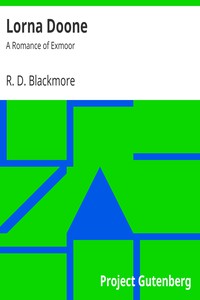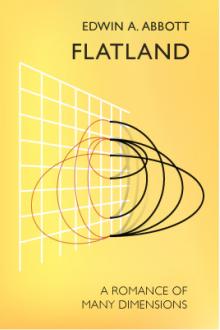Lorna Doone: A Romance of Exmoor by R. D. Blackmore (list of e readers TXT) 📖

- Author: R. D. Blackmore
Book online «Lorna Doone: A Romance of Exmoor by R. D. Blackmore (list of e readers TXT) 📖». Author R. D. Blackmore
'Vamous job this here,' cried John, looking up to be sure of it, because there were so many; 'here be my own nick on the post. Red Jem, too, and no doubt of him; he do hang so handsome like, and his ribs up laike a horse a'most. God bless them as discoovered the way to make a rogue so useful. Good-naight to thee, Jem, my lad; and not break thy drames with the craikin'.'
John Fry shook his bridle-arm, and smote upon Smiler merrily, as he jogged into the homeward track from the guiding of the body. But I was sorry for Red Jem, and wanted to know more about him, and whether he might not have avoided this miserable end, and what his wife and children thought of it, if, indeed, he had any.
But John would talk no more about it; and perhaps he was moved with a lonesome feeling, as the creaking sound came after us.
'Hould thee tongue, lad,' he said sharply; 'us be naigh the Doone-track now, two maile from Dunkery Beacon hill, the haighest place of Hexmoor. So happen they be abroad to-naight, us must crawl on our belly-places, boy.'
I knew at once what he meant—those bloody Doones of Bagworthy, the awe of all Devon and Somerset, outlaws, traitors, murderers. My little legs began to tremble to and fro upon Peggy's sides, as I heard the dead robber in chains behind us, and thought of the live ones still in front.
'But, John,' I whispered warily, sidling close to his saddle-bow; 'dear John, you don't think they will see us in such a fog as this?'
'Never God made vog as could stop their eyesen,' he whispered in answer, fearfully; 'here us be by the hollow ground. Zober, lad, goo zober now, if thee wish to see thy moother.'
For I was inclined, in the manner of boys, to make a run of the danger, and cross the Doone-track at full speed; to rush for it, and be done with it. But even then I wondered why he talked of my mother so, and said not a word of father.
We were come to a long deep 'goyal,' as they call it on Exmoor, a word whose fountain and origin I have nothing to do with. Only I know that when little boys laughed at me at Tiverton, for talking about a 'goyal,' a big boy clouted them on the head, and said that it was in Homer, and meant the hollow of the hand. And another time a Welshman told me that it must be something like the thing they call a 'pant' in those parts. Still I know what it means well enough—to wit, a long trough among wild hills, falling towards the plain country, rounded at the bottom, perhaps, and stiff, more than steep, at the sides of it. Whether it be straight or crooked, makes no difference to it.
We rode very carefully down our side, and through the soft grass at the bottom, and all the while we listened as if the air was a speaking-trumpet. Then gladly we breasted our nags to the rise, and were coming to the comb of it, when I heard something, and caught John's arm, and he bent his hand to the shape of his ear. It was the sound of horses' feet knocking up through splashy ground, as if the bottom sucked them. Then a grunting of weary men, and the lifting noise of stirrups, and sometimes the clank of iron mixed with the wheezy croning of leather and the blowing of hairy nostrils.
'God's sake, Jack, slip round her belly, and let her go where she wull.'
As John Fry whispered, so I did, for he was off Smiler by this time; but our two pads were too fagged to go far, and began to nose about and crop, sniffing more than they need have done. I crept to John's side very softly, with the bridle on my arm.
'Let goo braidle; let goo, lad. Plaise God they take them for forest-ponies, or they'll zend a bullet through us.'
I saw what he meant, and let go the bridle; for now the mist was rolling off, and we were against the sky-line to the dark cavalcade below us. John lay on the ground by a barrow of heather, where a little gullet was, and I crept to him, afraid of the noise I made in dragging my legs along, and the creak of my cord breeches. John bleated like a sheep to cover it—a sheep very cold and trembling.
Then just as the foremost horseman passed, scarce twenty yards below us, a puff of wind came up the glen, and the fog rolled off before it. And suddenly a strong red light, cast by the cloud-weight downwards, spread like fingers over the moorland, opened the alleys of darkness, and hung on the steel of the riders.
'Dunkery Beacon,' whispered John, so close into my ear, that I felt his lips and teeth ashake; 'dursn't fire it now except to show the Doones way home again, since the naight as they went up and throwed the watchmen atop of it. Why, wutt be 'bout, lad? God's sake—'
For I could keep still no longer, but wriggled away from his arm, and along the little gullet, still going flat on my breast and thighs, until I was under a grey patch of stone, with a fringe of dry fern round it; there I lay, scarce twenty feet above the heads of the riders, and I feared to draw my breath, though prone to do it with wonder.
For now the beacon was rushing up, in a fiery storm to heaven, and the form of its flame came and went in the folds, and the heavy sky was hovering. All around it was hung with red, deep in twisted columns, and then a giant beard of fire streamed throughout the darkness. The sullen hills were flanked with light, and the valleys chined with shadow, and all the sombrous moors between awoke in furrowed anger.
But most of all the flinging fire leaped into the rocky mouth of the glen below me, where the horsemen passed in silence, scarcely deigning to look round. Heavy men and large of stature, reckless how they bore their guns, or how they sate their horses, with leathern jerkins, and long boots, and iron plates on breast and head, plunder heaped behind their saddles, and flagons slung in front of them; I counted more than thirty pass, like clouds upon red sunset. Some had carcasses of sheep swinging with their skins on, others had deer, and one had a child flung across his saddle-bow. Whether the child were dead, or alive, was more than I could tell, only it hung head downwards there, and must take the chance of it. They had got the child, a very young one, for the sake of the dress, no doubt, which they could not stop to pull off from it; for the dress shone bright, where the fire struck it, as if with gold and jewels. I longed in my heart to know most sadly what they would do with the little thing, and whether they would eat it.
It touched me so to see that child, a prey among those vultures, that in my foolish rage and burning I stood up and shouted to them leaping on a rock, and raving out of all possession. Two of them turned round, and one set his carbine at me, but the other said it was but a pixie, and bade him keep his powder. Little they knew, and less thought I, that the pixie then before them would dance their castle
 Have you ever thought about what fiction is? Probably, such a question may seem surprising: and so everything is clear. Every person throughout his life has to repeatedly create the works he needs for specific purposes - statements, autobiographies, dictations - using not gypsum or clay, not musical notes, not paints, but just a word. At the same time, almost every person will be very surprised if he is told that he thereby created a work of fiction, which is very different from visual art, music and sculpture making. However, everyone understands that a student's essay or dictation is fundamentally different from novels, short stories, news that are created by professional writers. In the works of professionals there is the most important difference - excogitation. But, oddly enough, in a school literature course, you don’t realize the full power of fiction. So using our website in your free time discover fiction for yourself.
Have you ever thought about what fiction is? Probably, such a question may seem surprising: and so everything is clear. Every person throughout his life has to repeatedly create the works he needs for specific purposes - statements, autobiographies, dictations - using not gypsum or clay, not musical notes, not paints, but just a word. At the same time, almost every person will be very surprised if he is told that he thereby created a work of fiction, which is very different from visual art, music and sculpture making. However, everyone understands that a student's essay or dictation is fundamentally different from novels, short stories, news that are created by professional writers. In the works of professionals there is the most important difference - excogitation. But, oddly enough, in a school literature course, you don’t realize the full power of fiction. So using our website in your free time discover fiction for yourself. 




Comments (0)